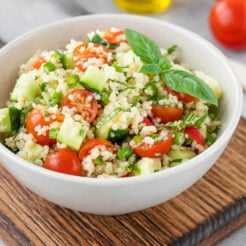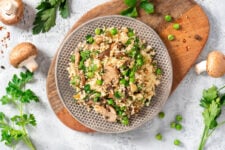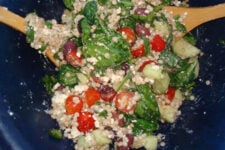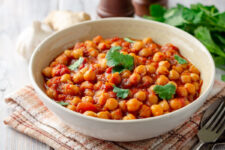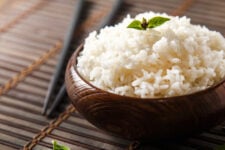Couscous is an extremely versatile food with a fun texture and appearance. If you’re looking for a pantry staple that can suit your desired flavor profile, all while cooking in under 15 minutes, then you’ve found the perfect fit!
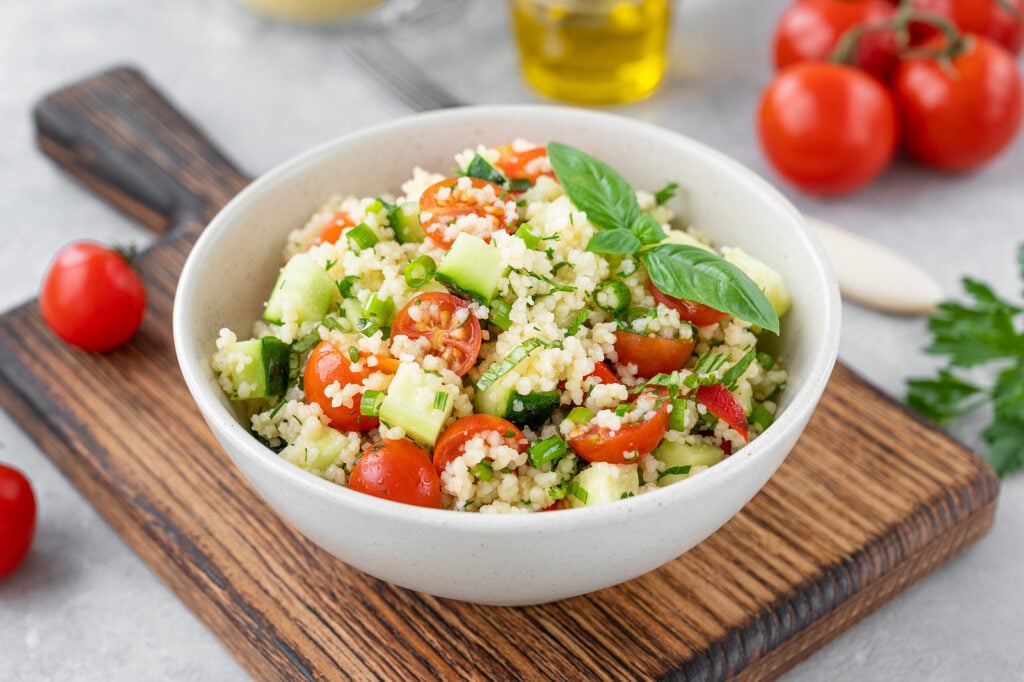
What exactly is couscous?
Couscous is a tiny type of pasta made of semolina flour from durum wheat and water. Originally from North Africa where it remains a staple food today, couscous is found in many cuisines including Middle Eastern, French, and Italian.
Types of Couscous
- Moroccan couscous: the smallest, has a fine texture, and is quickest to cook.
- Israeli couscous: also known as Pearl couscous, is larger round balls and closely resembles pasta.
- Lebanese couscous: also known as Moghrabieh couscous, is the largest in size, similar to a pea.
All three of the above types of couscous are available in whole wheat, which means the whole grain has been kept intact, yielding the most health benefits.
Instant couscous is pre-cooked and dried, a common form found in many grocery stores.
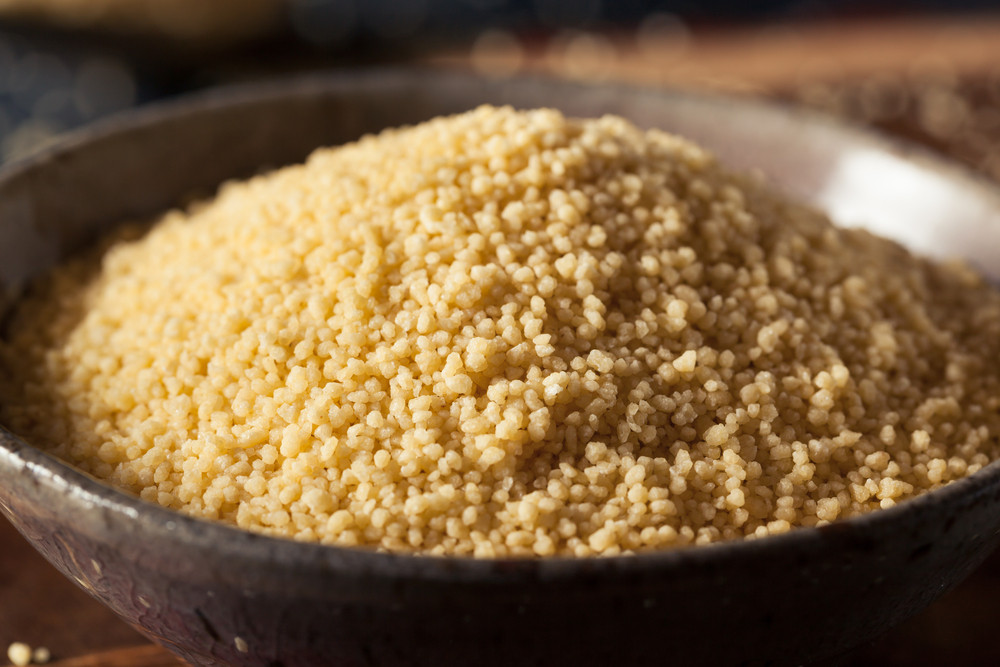
Is Couscous Healthy?
Couscous is generally a healthful food that you can feel comfortable including as part of a well-balanced diet. It’s naturally low in fat, can be a good source of fiber (the whole wheat version), and provides some protein, B vitamins, and minerals (1). It fits into many different types of diets such as Vegan, Vegetarian, Mediterranean, Plant-based, and DASH, among others.
When compared to other grains, couscous isn’t the most nutrient-dense choice. However, when choosing a recipe, be sure to combine it with additional healthful ingredients to enhance the nutrient profile of the meal.
Since it’s made from milled durum wheat, it’s naturally gluten-containing and would not be suitable for anyone with gluten intolerance following a gluten-free diet. It is also a high-fructan food and is not recommended for a low-FODMAP diet.
Health Benefits of Couscous
On its own, couscous provides a good source of fiber, some plant-based protein, and is a great source of selenium.
Fiber Source
- Choose whole wheat couscous for the highest fiber content. 1 cup of cooked whole wheat couscous provides 8 grams of fiber, compared to only 2 grams of fiber in the same amount of traditional refined (1).
- Adequate fiber intake is known to reduce the risk of developing many health conditions such as heart disease, various types of cancer, and diabetes (2). Fiber also adds low-calorie bulk to the diet, lending to bowel regularity and weight control.
Protein Source
- Couscous provides a plant-based source of protein. There is 6 grams of protein in 1 cup of cooked couscous, the same amount as in one egg (1).
- Since the body is not able to make all of the amino acids necessary for good health, we rely on the food we eat to supply these essential amino acids (3). Combining couscous with legumes, such as beans, will make a complete protein with all essential amino acids present.
Selenium
- Couscous is a good source of the trace mineral Selenium, providing 79% of the Recommended Dietary Allowance (RDA) for adults in just 1 cup (4). Selenium plays an important role in the body as a component of proteins and enzymes, called selenoproteins, which help to make DNA and protect against cell damage (5).
Is couscous healthy for diabetics?
Couscous is a healthful choice for anyone following a diabetic diet. For optimal blood sugar control, keep in mind that 1/2 Cup of cooked couscous contains 18 g of carbohydrate, so be sure to calculate your carb intake accordingly (1).
Adding non-starchy veggies, such as cucumbers, tomatoes, or riced cauliflower will increase the bulk and fiber content, aiding to reduce total carbohydrate intake. Choose the whole wheat version to further maximize your fiber intake and reduce post-meal blood sugar levels.
Is couscous healthy for weight loss?
Couscous will fit right into a diet plan that is aiming to promote weight loss. One approach is to make couscous a part of the meal, but not the main dish, in order to keep your caloric intake in check.
Choose the whole wheat version and add many vegetables to bump up your fiber intake. Adding more fiber to your diet will keep you feeling fuller for longer periods of time, helping to limit your overall calorie intake.
How to Prepare It
You can cook couscous and have it ready in under 15 minutes, much faster than other grains (such as brown rice or white rice). Cooked similarly to pasta, it is steeped in boiling water and left to sit in a lidded pot:
- 5-10 minutes for traditional (refined)
- 10-15 minutes for whole wheat
It can be consumed hot or cold, adding to great versatility and you can enhance the flavor by cooking it in vegetable stock or another type of broth.
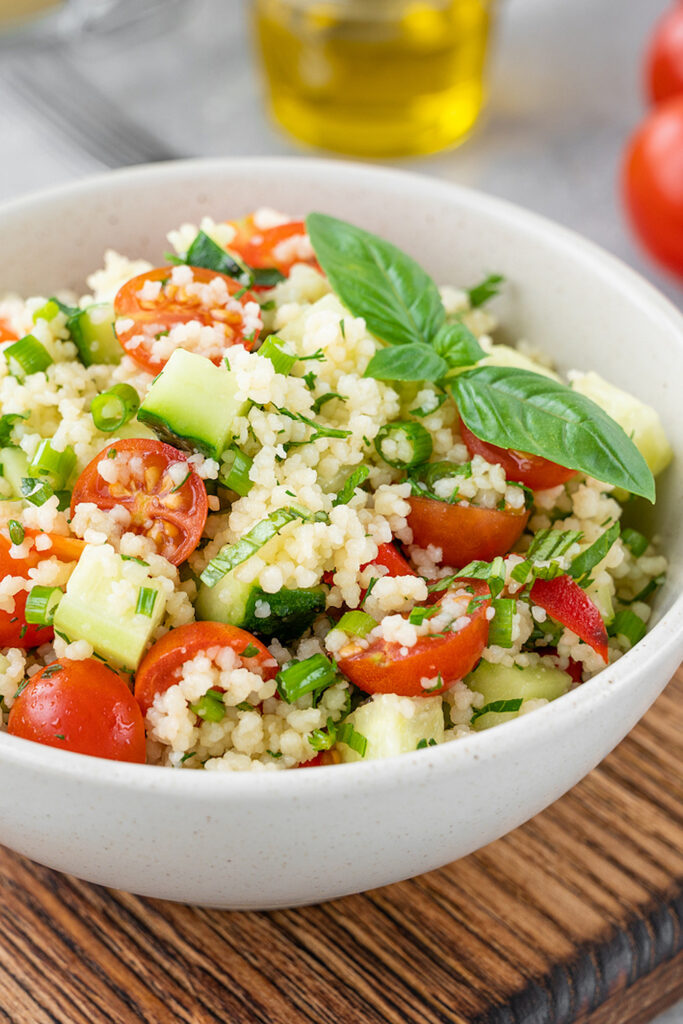
How to Serve It
There is endless potential to add additional healthful ingredients to a couscous dish, such as:
- Vegetables including cucumbers, tomatoes, scallions, onions, bell peppers, zucchini, eggplant, mushrooms, riced cauliflower, shredded carrots, fennel, sweet potatoes
- Legumes like white beans, peas, chickpeas, lentils
- Fresh herbs such as mint, basil, coriander, parsley, cilantro
- Healthy fats like virgin olive oil, avocado oil
- Nuts including chopped almonds, hazelnuts, pistachios, pine nuts, walnuts
Ready to get started with a simple couscous recipe? Try the tasty and healthful couscous salad recipe below, or perhaps our delicious Greek Couscous Salad recipe with Israeli couscous. Enjoy!
Healthy Couscous Salad
Ingredients
For the Salad
- 1 cup couscous dry pearl variety
- 1 tsp extra virgin olive oil
- 1 cup grape tomatoes halved
- 1/2 cup cucumber chopped
- 1 small onion chopped
- 10-15 fresh basil leaves
- 2/3 cup chickpeas
- 1/3 cup feta cheese crumbled
- 4-6 Kalamata olives
For the Dressing
- 3 tbsp extra virgin olive oil
- 1 tbsp red wine vinegar
- 1/2 lemon juiced (should yield about 1-1.5 tbsp)
- 1 tsp Dijon mustard
- 1/2 tsp dried oregano
- 1 garlic clove minced
- sea salt
- black pepper
Instructions
- Combine all dressing ingredients in a bowl. Whisk well and set aside.
- Heat the oil in a saucepan and add the couscous. Sauté for 2-3 minutes until fragrant.
- Add water to the couscous and bring it to a boil. Cover and cook for 7-10 minutes until soft.
- Remove from heat, transfer to a fine-mesh strainer, and rinse. Shake off any excess water and set aside.
- Add the grape tomatoes, cucumber, olives, onion, chickpeas, basil leaves, and feta cheese in a large mixing bowl. Drizzle on half the dressing and toss well. Add additional dressing to taste.
- Add the couscous and mix gently.
- Divide into two salad bowls and serve.
Notes
- Toasting the pearl couscous in oil intensifies the flavor. But if you’re trying to reduce oil in your diet, you can skip this part and simply add water and boil according to package directions.
- For added flavor, you can cook the couscous in vegetable/chicken broth instead of water.
- To make it slightly spicy, you can coat the chickpeas with a dash of cayenne pepper before tossing it with the rest of the ingredients.
Nutrition

About the Author
Jessica Panetta, MA, RD, LDN, is a Registered Dietitian and nutrition educator with a passion for helping others find a balanced relationship with food. She is a devoted mom, enjoys organic gardening, and loves to create veggie-packed muffin recipes for her kids.

